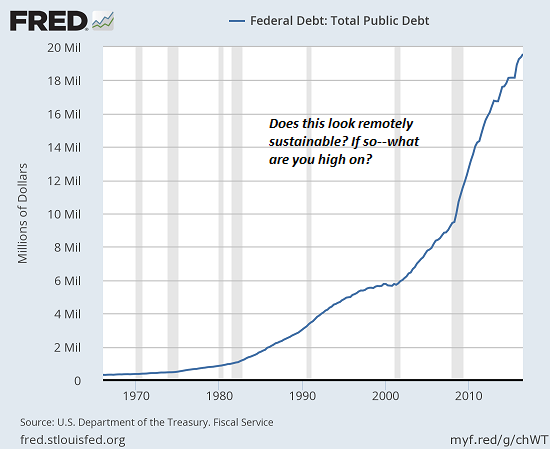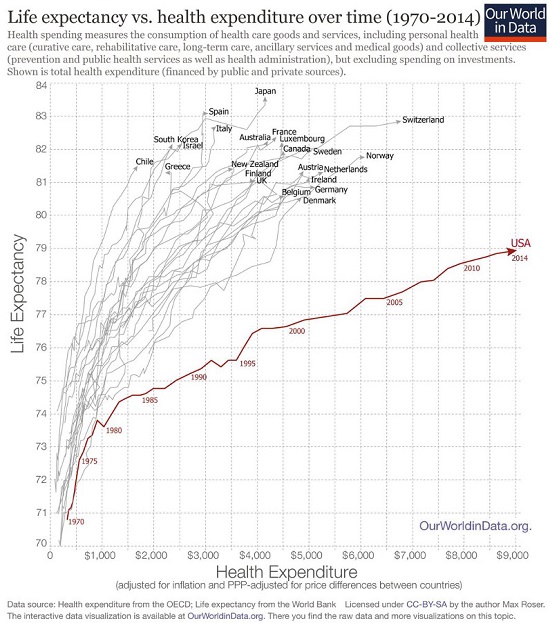Submitted by Charles Hugh-Smith via OfTwoMinds blog,
What's progressive? Pushing power, agency, skills, capital and solutions down to the individual, household, community, enterprise, town and city levels and focusing on doing more with much less.
We know what fake-Progressives support: neocon-neoliberal policies and narratives that enable elite privilege, power and Imperial pretensions.
So what's truly progressive? We can start with four things:
1. Focus on developing skills that build capital, not on issuing costly credentials controlled by cartels.
2. Accept that borrowing from future generations to pay today's expenses is morally and financially bankrupt.
3. Fix healthcare by integrating medicine with the causes of illness– lifestyle, diet, fitness, agency and culture–and decentralized programs of prevention.
4. Accept that "growth" of consumption, debt, GDP, etc. is no longer the solution, it's the problem: Degrowth is the solution.
Focusing on issuing more credentials fails students and enriches the institutions that monopolize the credentials. As I explain in my book The Nearly Free University and the Emerging Economy, the solution is to accredit the student, not the school.
Education that actually has value in the emerging economy is based not on jumping through hoops at enormous expense to obtain a credential, but on acquiring the skills and values needed to build capital in all its forms.
Issuing a student another credential doesn't magically lift them out of poverty; to escape poverty, people need a wealth of real-world skills and the set of soft-skills/values I call the eight essential skills in my book Get a Job, Build a Real Career and Defy a Bewildering Economy.
Accrediting the student rather than the institution will require upending the costly bureaucracy of higher education, radically reducing costs while radically improving outcomes.
Take a look at this chart of federally funded debt-serfdom, i.e. student loans, and explain what is remotely progressive about debt-serfdom in service of credentials with marginal market value.
And while we're looking at debt, look at the trajectory of federal debt and ask yourself: "does this look healthy or sustainable?" The answer is obviously no; this trajectory leads to fiscal bankruptcy, and it is morally bankrupt to burden future generations to pay today's bloated, wasteful expenses just to maintain the status quo.


It is insane to encourage an unhealthy lifestyle and then wonder why the costs of treating the illnesses we've generated are skyrocketing. The obvious solution is to look at health as an ecosystem of inputs and dynamics that interact in predictable ways. If we put garbage in, we get garbage (poor health) out. In essence, the current system relieves the participants ("patients") of the responsibility to be part of the solution, and offers few ways for people to participate in regaining their health.
The solutions are visible, but they're not profitable to the status quo, so we get a system that is more expensive than any other on Earth while yielding subpar outcomes.

"Growth" as the solution to every problem may have worked in 1945, but runaway "growth" of debt-funded consumption was do-able when resources were abundant, the population of high-consumption humans was lower and debt was modest. None of those apply today.
The only solution going forward is Degrowth: doing more with much less. The only way to manage this progress is to decentralize the power and control; centralization, like "growth," is itself the problem, not the solution.
I lay out how to structure a global network of community economies geared to doing more with much less in my book A Radically Beneficial World: Automation, Technology and Creating Jobs for All.
What's progressive? Pushing power, agency, skills, capital and solutions down to the individual, household, community, enterprise, town and city levels and focusing on doing more with much less. This requires completely disrupting the debt-based, wasteful, centralized, privilege-protecting status quo.
The post What’s Truly Progressive? appeared first on crude-oil.top.
